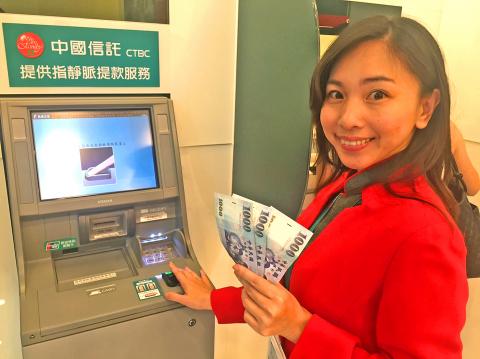CTBC Bank Co Ltd (中國信託銀行) yesterday unveiled a number of key technologies to back its transition toward the digitization of financial services, or the so-called “Bank 3.0.”
A pilot program utilizing biometirc security and mobile devices began yesterday for employees working at the 3 hectare CTBC Financial Park in Taipei’s Nangang Business Park, the company said.
The bank plans to extend the digitized services to consumers in about six months, it said.

Photo: CNA
The bank is also implementing finger vein scanning and facial recognition at its automatic teller machines (ATM), which would allow customers to withdraw money without having to use a bank card or PIN.
The finger vein technique was pioneered by the Japanese firm Hitachi Ltd and is based on the unique pattern of veins inside a finger. Only a living finger is accepted by the scanner, which is believed to make vein recognition a more secure technology than fingerprint scanning.
The finger vein sensor has a false match rate of 0.01 percent, and its accuracy in measuring the blood flow of a user for identity authentication is unaffected by variations in age and physical condition, the bank said, citing findings by US-based International Biometric Group.
The technology is already in use in some bank ATMs in Japan and Poland.
CTBC Bank said it has begun using tablets to cut down on waiting times for customers visiting branch office and is planning to transform smartphones into wallets by adding near field communication and QR Code scanning capabilities.
Consumers would to be able to make deposits, send wire transfers and take out loans by using the bank’s ATMs in 24-hour convenience stores, it said.
The digitized services are still awaiting regulatory approval and their implementation will require the consent of customers, CTBC Bank said.
However, the company said that more than 60 percent of customers still prefer face-to-face service, based on a study by Ernst & Young last year.
Additional reporting by staff writer

Macronix International Co (旺宏), the world’s biggest NOR flash memory supplier, yesterday said it would spend NT$22 billion (US$699.1 million) on capacity expansion this year to increase its production of mid-to-low-density memory chips as the world’s major memorychip suppliers are phasing out the market. The company said its planned capital expenditures are about 11 times higher than the NT$1.8 billion it spent on new facilities and equipment last year. A majority of this year’s outlay would be allocated to step up capacity of multi-level cell (MLC) NAND flash memory chips, which are used in embedded multimedia cards (eMMC), a managed

CULPRITS: Factors that affected the slip included falling global crude oil prices, wait-and-see consumer attitudes due to US tariffs and a different Lunar New Year holiday schedule Taiwan’s retail sales ended a nine-year growth streak last year, slipping 0.2 percent from a year earlier as uncertainty over US tariff policies affected demand for durable goods, data released on Friday by the Ministry of Economic Affairs showed. Last year’s retail sales totaled NT$4.84 trillion (US$153.27 billion), down about NT$9.5 billion, or 0.2 percent, from 2024. Despite the decline, the figure was still the second-highest annual sales total on record. Ministry statistics department deputy head Chen Yu-fang (陳玉芳) said sales of cars, motorcycles and related products, which accounted for 17.4 percent of total retail rales last year, fell NT$68.1 billion, or

In the wake of strong global demand for AI applications, Taiwan’s export-oriented economy accelerated with the composite index of economic indicators flashing the first “red” light in December for one year, indicating the economy is in booming mode, the National Development Council (NDC) said yesterday. Moreover, the index of leading indicators, which gauges the potential state of the economy over the next six months, also moved higher in December amid growing optimism over the outlook, the NDC said. In December, the index of economic indicators rose one point from a month earlier to 38, at the lower end of the “red” light.

The global server market is expected to grow 12.8 percent annually this year, with artificial intelligence (AI) servers projected to account for 16.5 percent, driven by continued investment in AI infrastructure by major cloud service providers (CSPs), market researcher TrendForce Corp (集邦科技) said yesterday. Global AI server shipments this year are expected to increase 28 percent year-on-year to more than 2.7 million units, driven by sustained demand from CSPs and government sovereign cloud projects, TrendForce analyst Frank Kung (龔明德) told the Taipei Times. Demand for GPU-based AI servers, including Nvidia Corp’s GB and Vera Rubin rack systems, is expected to remain high,